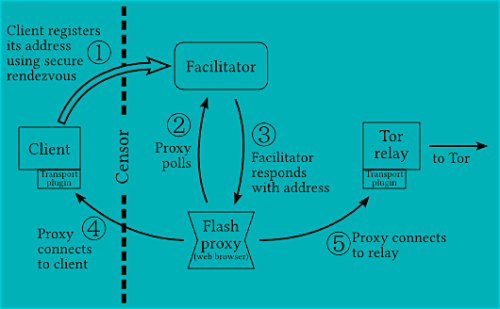Freedom of Speech Roundup
by Sampsonia Way / March 30, 2013 / No comments
In the weekly Freedom of Speech Roundup, Sampsonia Way presents some of the week’s top news on freedom of expression, journalists in danger, artists in exile, and banned literature.

Flash proxies are a new tool used to connect to the Tor project in order to circumvent Internet censorship. The process is shown above. Photo: Stanford University.
Flash Proxies: Circumventing Internet Censorship with Tor
Ghacks. To circumvent Internet censorship, users typically employ a proxy to access the blocked content. The Tor project’s Tor software is an effective proxy for accessing blocked sites, but its public nature provides censors with the means to easily blacklist the service’s relays. Now Stanford researchers have come up with Flash Proxies, which tap into the vast IP address pool of regular Internet users to use them as a proxy to connect to the Tor network. See how they work.
Burma: Newspapers Going Daily, but the Transformation to Watch may be in Mobile
Nieman Journalism Lab. Far from heralding the arrival of “the end of censorship” and a new golden era of Burmese press, the move to daily publications is one juncture in a larger set of transitions defining the new state of media in Myanmar. Even with its remarkable turnabout in the last few years, the country is still finding its way. Read here.
China: Censorship on Sina Weibo a ‘Sophisticated’ and Speedy Operation
Tech Crunch. Two researchers have made the first “real-time analysis of Weibo posts” and in the course of a month found that most censorship of posts happens within the first 24 hours. Some posts were even deleted in as quickly as five minutes. The scientists said that Sina Weibo would need to employ at least 4,000 censors every day if none of the process was automated. Read here.
Bangladesh Gags Award-Winning Blogger
DW. The Bangladesh government has banned Asif Mohiuddin’s blog in a string of bans instituted to silence blogs that are “anti-state or anti-religious.” Mohiuddin, known for his criticism of religious fundamentalism was brutally attacked by unknown assailants last January. Read here.
BBC Suspends Sri Lanka FM Reports
BBC. BBC has banned FM reports in Sri Lanka after portions of the content were blocked, edited, or only partially broadcasted. A chairman from the Sri Lanka Broadcasting Company admitted to censoring content because “he has a duty to do so at a time of war.” Read here.
Kashmir: Filmmakers Harassed, Writers Speak Out
Kashmir Media Service. Though there have been several documentaries on Kashmir, including Jashn-e-Azadi by Sanjay Kak, filmmakers aren’t allowed to work there freely. They have to shoot with low profile and hide the cameras in robes or luggage. Otherwise, they may have their footage deleted and the work halted by the civil and military authorities. Read here.
Video: Democracy Now!
Democracy Now! Documentary filmmaker Sanjay Kak and author Arundhati Roy speak about foreign media’s portrayal of the current situation in Kashmir, recent curfews, press bans, and internet shut downs in the area, and why the death of Afzal Guru is so important. Kak and Roy have been harassed, threatened, arrested, and banned in India for expressing their opinions about Kashmir. Read here.
In India, Media Gag Order On Rape Trial Lifted
CPJ. Indian media will now be able to cover the rape trial of a 23-year-old girl that was attacked on a bus last December. One journalist from each accredited media organization will be allowed to attend the trial. Reporters are still prohibited from printing the name of the victim or any witnesses. Read here.
In Central African Republic, Rebel Forces Ransack News Outlets
CPJ. Two news outlets were raided by rebel groups after the President was ousted from power. Radio Ndeke Luka was forced to temporarily stop production after the assailants seized a station vehicle, computers, and several motorcycles. Le Confident, a daily newspaper, also halted publication because of the raid. Read here.
New UK Media Curbs May Please Beijing
The Huffington Post. Britain’s new media regulations that impose censorship on “relevant” bloggers may influence stricter governments with “scrupulous intentions” in countries like China and Iran. Read here.
Vietnam’s Internet Dilemma: Online Censorship
The Irrawaddy. Vietnamese blogger Nguyen Dac Kien has been fired from state-run newspaper Family and Society for criticizing the general secretary of the Vietnamese Communist Party. Dac Kien is one of many bloggers who have recently been detained for crossing the Communist party, despite the growing interest in using the Internet to get the public involved in political reform. Read here.
India: Rare Nationalist Works, Banned by the British, In Danger of Being Lost Forever
Times of India. A collection of plays, books, and pamphlets that were banned during the British occupation of India are now “buried” at the National Archives in Delhi and the India Office Library at the British Museum. Indian literary critic and writer Deepak Mehta says its time to revisit the texts and digitize their pages. Read here.




